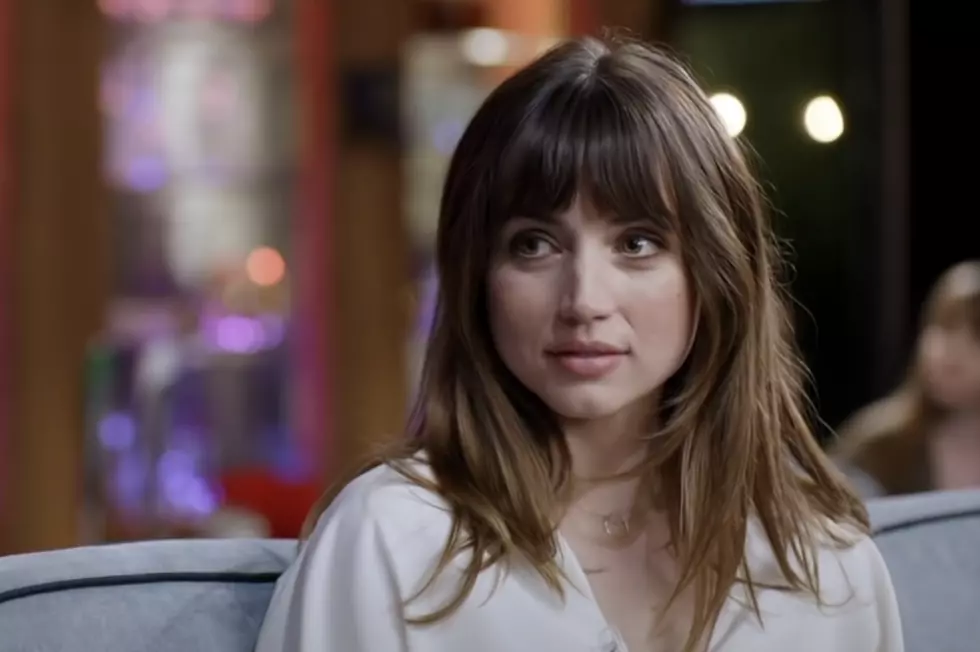
‘Steve Jobs’ Review: iDidntloveit
Apple introduced the iMac computer to the market with one of the most famous marketing slogans of all time: “Think different.” If nothing else, Danny Boyle’s Steve Jobs embodies that sentiment.
This is not a typical Hollywood biopic, with a great, flawed man looking back on his rise, fall, and comeback. (It does, however, end with its great, flawed man receiving a standing ovation, because it’s a law in California that all biopics, no matter how unusual, must end with a standing ovation.) Instead, the film, which was adapted by Oscar-winning writer Aaron Sorkin from the best-selling biography by Walter Isaacson, consists of just three lengthy scenes set backstage at three different product launches. As Steve Jobs (Michael Fassbender) prepares for these all-important sales pitches, he fends off distractions like malfunctioning equipment, curious reporters, disgruntled co-workers, and a daughter he initially refuses to acknowledge is actually his child. That’s it; no humble beginnings, no precipitous collapse, no ominous portends. Boyle doesn’t even show any of the presentations Jobs spends the entire movie preparing for. By design, the movie is all setup and no payoff.
Steve Jobs certainly thinks different, but it doesn’t think deeply enough. That three-scene structure is undeniably unique; it’s also frustratingly repetitive and dramatically restrictive. In 1984 (at the launch of the first Macintosh), in 1988 (at the introduction of the NeXT computer Jobs developed after he left Apple), and in 1998 (at the first public appearance of the iMac), Jobs has conversations with the same handful of employees and advisors. There’s Steve Wozniak (Seth Rogen), who co-founded Apple with Jobs and built its earliest computers; Apple CEO John Sculley (Jeff Daniels), who begins the film as Jobs’ most trusted confident and later becomes his chief rival; and Andy Hertzfeld (Michael Stuhlbarg), a key designer of the original Mac. While Jobs addresses their various needs, he also (reluctantly) meets with Christine Brennan (Katherine Waterston), the mother of Lisa (Perla Haney-Jardine, Ripley Sobo, and Makenzie Moss, depending on the scene), the daughter Jobs prefers to pretend does not exist. In 1984, while Jobs’ Apple stock is worth over $400 million, Christine and Lisa are barely scraping by on Welfare.
With its claustrophobic atmosphere and slightly surreal structure, Steve Jobs feels a bit like a Silicon Valley Christmas Carol, with Fassbender as its miserly Scrooge grappling with admonishing ghosts from his past (Woz), present (Sculley), and future (Lisa). Some of these conversations are interesting. But after the first go-round, repeating them all two more times in minor variations yields few additional insights into Jobs’ life or philosophies.
Jobs feels like a deliberate companion piece to Aaron Sorkin’s The Social Network, another unconventional biopic about a tech genius who reshaped our world in his own warped image. But The Social Network did a better job of turning the tug-of-war over Facebook into a gripping thriller, and of getting inside the mind of its communicatively challenged protagonist. It also had the benefit of David Fincher’s bravura direction, something Danny Boyle never approaches with Steve Jobs. He certainly coaxes sharp performances from his actors (particularly Kate Winslet as Jobs’ long-suffering right-hand woman Joanna Hoffman), but he doesn’t so much elevate the material as stay out of its way. Fassbender doesn’t really look or sound like Steve Jobs, but his own magnetic charisma is a nice match for Jobs’ rock-star CEO persona.
Boyle and Sorkin deserve credit for avoiding many of the pitfalls that so many other biopic filmmakers fall into, and for making an iconoclastic movie about an iconoclast. (For all his bluster, their version of Jobs — supposedly the tech revolutionary of the century — is a guy who fails over and over, on both a personal and professional level, until he finally gets a few things right.) But like my iPhone 5s, the whole thing runs out of juice way too quickly. For all its flashy Sorkin dialogue, it leaves too much unsaid about its subject, and his curious obsessions and contradictions.
One of Jobs’ recurring fights with Wozniak is over “end-to-end control” of the Macintosh; unlike typical PCs which are full of open slots and can be opened up and augmented with additional hard drives or memory, the Mac does not lend itself to user modification. In fact, you need a special tool just to open its housing. Steve Jobs presents Jobs himself as the living embodiment of his “end-to-end control” Macintosh. Even though Fassbender is in every single scene — and practically every single shot — he remains an impenetrable figure. Sorkin and Boyle never find the special tool they need to crack him open and get to his inner workings. Like the man it profiles, Steve Jobs is easy to admire and difficult to love.
More From ScreenCrush









